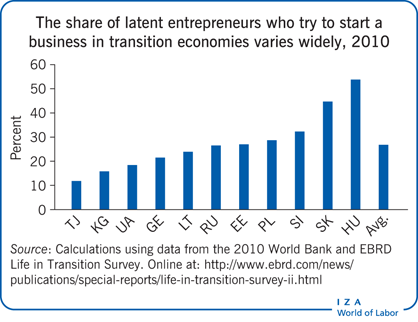Elevator pitch
Because entrepreneurial activity can stimulate job creation and long-term economic growth, promoting entrepreneurship is an important goal. However, many financial, bureaucratic, and social barriers can short-circuit the process of actually starting a business, especially in transition economies that lack established institutional systems and markets. The main obstacles are underdeveloped financial markets, perceptions of administrative complexity, political and economic instability, and lack of trust in institutions. Gender disparities in the labor market are also reflected in less entrepreneurial activity among women than men.

Key findings
Pros
Increasing access to finance and loans helps latent entrepreneurs move to the next stage of trying to start a business.
Reducing the number of procedures required to start a business can make it easier for latent entrepreneurs to become active entrepreneurs.
While there are fewer women than men at each stage of entrepreneurship, women are as likely as men to successfully start a business once they attempt it.
Social capital is especially helpful for women’s entrepreneurship, indicating that it can compensate for the connections and resources they are less likely to gain in the labor market.
Cons
Many people who would like to be entrepreneurs never progress beyond latent entrepreneurship, especially in transition economies.
Underdeveloped financial markets and inadequate financial capital remain serious obstacles to the expansion of entrepreneurship.
Perceptions of administrative complexity, political and economic instability, and lack of trust in institutions are key impediments to starting a business.
Less entrepreneurial activity among women than men mirrors gender disparities in the labor market.